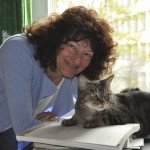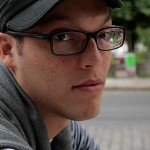Six Poems from Painted Stars by Pierre Reverdy, translated by Dan Bellm
Le monde plate-forme
by Pierre Reverdy
La moitié de tout ce qu’on pouvait voir glissait. Il y avait des danseurs près des phares et des pas de lumière. Tout le monde dormait. D’une masse d’arbres dont on ne distinguait que l’ombre — l’ombre qui marchait en se séparant des feuilles, une aile se dégagea, peu à peu, secouant la lune dans un battement rapide et mou. L’air se tenait tout entier. Le pavé glissant ne supportait plus aucune audace et pourtant c’était en pleine ville, en plein nuit — le ciel se rattachant à la terre aux maisons du faubourg. Les passants avaient escaladé un autre monde qu’ils regardaient en souriant. Mais on ne savait pas s’ils resteraient plus longtemps là ou s’ils iraient tomber enfin dans l’autre sens de la ruelle.
The platform world
by Pierre Reverdy
Half of what was visible was sliding. There were dancers near the beacons and footsteps of light. Everyone was asleep. Out from a mass of trees where nothing could be seen but shadow—the shadow that was walking, detaching itself from the leaves—little by little a wing flew free, shaking off the moon with a quick and muffled beat. The air kept completely still. The slippery pavement would bear no more audacity, but it was right in the middle of town, in the dead of night, the sky fastening itself to the earth with its rows of houses. Passersby had scaled another world that they gazed at with a smile. But there was no way of knowing whether they would stay there any longer or go fall at last into the other direction of the little street.
translated from French by Dan Bellm
more>>
Le monde plate-forme
by Pierre ReverdyLa moitié de tout ce qu’on pouvait voir glissait. Il y avait des danseurs près des phares et des pas de lumière. Tout le monde dormait. D’une masse d’arbres dont on ne distinguait que l’ombre — l’ombre qui marchait en se séparant des feuilles, une aile se dégagea, peu à peu, secouant la lune dans un battement rapide et mou. L’air se tenait tout entier. Le pavé glissant ne supportait plus aucune audace et pourtant c’était en pleine ville, en plein nuit — le ciel se rattachant à la terre aux maisons du faubourg. Les passants avaient escaladé un autre monde qu’ils regardaient en souriant. Mais on ne savait pas s’ils resteraient plus longtemps là ou s’ils iraient tomber enfin dans l’autre sens de la ruelle.
The platform world
by Pierre ReverdyHalf of what was visible was sliding. There were dancers near the beacons and footsteps of light. Everyone was asleep. Out from a mass of trees where nothing could be seen but shadow—the shadow that was walking, detaching itself from the leaves—little by little a wing flew free, shaking off the moon with a quick and muffled beat. The air kept completely still. The slippery pavement would bear no more audacity, but it was right in the middle of town, in the dead of night, the sky fastening itself to the earth with its rows of houses. Passersby had scaled another world that they gazed at with a smile. But there was no way of knowing whether they would stay there any longer or go fall at last into the other direction of the little street.
translated from French by Dan Bellm
L’ombre et l’image
by Pierre Reverdy
Si j’ai ri ce n’est pas du monde éclatant et joyeux qui passait devant moi. Les têtes penchées ou droites me font peur et mon rire aurait changé de forme en une grimace. Les jambes qui courent tremblent et les pieds plus lourds manquent le pas. Je n’ai pas ri du monde qui passait devant moi — mais parce que j’étais seul, plus tard, dans les champs, devant la forêt énorme et calme et sous les voix qui, dans l’air endormi, se répondaient.
Shadow and image
by Pierre Reverdy
If I laughed it wasn’t because of the bright and joyful world passing before me. Heads leaning forward or facing straight ahead scare me, and my laugh would have turned into a grimace. Running legs tremble and heavy feet misstep. I wasn’t laughing at the world passing before me—I laughed because I was alone, later on, in the country, standing in front of the calm enormous forest under voices that answered each other in the drowsy air.
translated from French by Dan Bellm
more>>
L’ombre et l’image
by Pierre ReverdySi j’ai ri ce n’est pas du monde éclatant et joyeux qui passait devant moi. Les têtes penchées ou droites me font peur et mon rire aurait changé de forme en une grimace. Les jambes qui courent tremblent et les pieds plus lourds manquent le pas. Je n’ai pas ri du monde qui passait devant moi — mais parce que j’étais seul, plus tard, dans les champs, devant la forêt énorme et calme et sous les voix qui, dans l’air endormi, se répondaient.
Shadow and image
by Pierre ReverdyIf I laughed it wasn’t because of the bright and joyful world passing before me. Heads leaning forward or facing straight ahead scare me, and my laugh would have turned into a grimace. Running legs tremble and heavy feet misstep. I wasn’t laughing at the world passing before me—I laughed because I was alone, later on, in the country, standing in front of the calm enormous forest under voices that answered each other in the drowsy air.
translated from French by Dan Bellm
Mécanique verbale et don de soi
by Pierre Reverdy
Aucun mot n’aurait mieux pu, sans doute, exprimer sa joie. Il le dit et tous ceux qui attendaient contre le mur tremblèrent. Il y avait au centre un grand nuage — une énorme tête et les autres observaient fixement les moindres pas marqués sur le chemin. Il n’y avait rien pourtant et dans le silence les attitudes devenaient difficiles. Un train passa derrière la barrière et brouilla les lignes qui tenaient le paysage debout. Et tout disparut alors, se mêla dans le bruit ininterrompu de la pluie, du sang perdu, du tonnerre ou des paroles machinales, du plus important de tous ces personnages.
Verbal mechanics and gift of self
by Pierre Reverdy
No doubt about it; no other word could have better expressed his joy. Everyone who was waiting against the wall trembled when he said it. There was a large cloud in the middle—an enormous head—and the others stared at the slightest marks of footsteps on the path. Yet there was nothing there, and it was becoming difficult to know in the silence what attitude to strike. Behind the fence a train went by, blurring the lines that held the scene upright. Then everything disappeared, mingled with the unbroken sound of rain, lost blood, thunder, or the mechanical words that the most important of these characters said.
translated from French by Dan Bellm
more>>
Mécanique verbale et don de soi
by Pierre ReverdyAucun mot n’aurait mieux pu, sans doute, exprimer sa joie. Il le dit et tous ceux qui attendaient contre le mur tremblèrent. Il y avait au centre un grand nuage — une énorme tête et les autres observaient fixement les moindres pas marqués sur le chemin. Il n’y avait rien pourtant et dans le silence les attitudes devenaient difficiles. Un train passa derrière la barrière et brouilla les lignes qui tenaient le paysage debout. Et tout disparut alors, se mêla dans le bruit ininterrompu de la pluie, du sang perdu, du tonnerre ou des paroles machinales, du plus important de tous ces personnages.
Verbal mechanics and gift of self
by Pierre ReverdyNo doubt about it; no other word could have better expressed his joy. Everyone who was waiting against the wall trembled when he said it. There was a large cloud in the middle—an enormous head—and the others stared at the slightest marks of footsteps on the path. Yet there was nothing there, and it was becoming difficult to know in the silence what attitude to strike. Behind the fence a train went by, blurring the lines that held the scene upright. Then everything disappeared, mingled with the unbroken sound of rain, lost blood, thunder, or the mechanical words that the most important of these characters said.
translated from French by Dan Bellm
